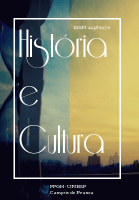
Historia e Cultura
Scope & Guideline
Connecting Cultures: A Gateway to Historical Insights
Introduction
Aims and Scopes
- Interdisciplinary Historical Analysis:
The journal emphasizes the importance of integrating methodologies from various fields, including history, sociology, and cultural studies, to provide comprehensive insights into historical events and cultural phenomena. - Focus on Latin American Contexts:
A significant portion of the journal's content is dedicated to the historical and cultural dynamics of Latin America, examining political movements, social changes, and cultural expressions across different periods. - Exploration of Gender and Identity:
A core area of interest is the exploration of gender roles and identities throughout history, investigating how these factors influence cultural narratives and historical interpretations. - Cultural Heritage and Memory Studies:
The journal often delves into themes of cultural heritage, memory, and identity, analyzing how societies remember and represent their pasts through various mediums, including literature, art, and music. - Critical Examination of Political Ideologies:
There is a consistent focus on the examination of political ideologies, particularly fascism and integralism, and their impact on cultural and historical narratives within Latin America.
Trending and Emerging
- Digital Humanities and New Media:
There is a growing interest in the intersection of digital humanities and historical research, with scholars exploring how digital tools can enhance the study of cultural heritage and historical narratives. - Postcolonial Perspectives:
Recent publications increasingly reflect postcolonial perspectives, examining the legacies of colonialism and their ongoing impacts on contemporary cultural identities and historical interpretations. - Environmental History:
Emerging themes in environmental history are gaining traction, focusing on the interactions between humans and their environments throughout history, particularly in relation to socio-political developments. - Intersections of Music and Politics:
The exploration of music as a form of political expression and its role in shaping cultural identities has emerged as a significant trend, reflecting broader societal movements and historical contexts. - Memory and Trauma Studies:
There is an enhanced focus on memory and trauma studies, particularly concerning how societies grapple with collective memories of conflict, dictatorship, and oppression.
Declining or Waning
- Traditional Narratives of National Histories:
There is a noticeable decline in traditional narratives that focus solely on national histories, particularly those that do not engage with broader transnational or comparative perspectives. - Classical Historical Methodologies:
The journal has seen a reduction in the use of classical historical methodologies that prioritize chronological narratives over thematic or interdisciplinary approaches. - Narrow Focus on Elite Cultural Figures:
Research concentrating on elite cultural figures has become less prominent, with a shift towards more inclusive studies that explore marginalized voices and experiences. - Static Representations of Historical Events:
Themes that offer static or uncritical representations of historical events are less frequent, suggesting a move towards more dynamic and critical engagements with history.
Similar Journals

Revista de Historia da Sociedade e da Cultura
Fostering Scholarly Discourse on Our PastRevista de História da Sociedade e da Cultura is a distinguished open access journal published by UNIV COIMBRA, FAC LETRAS, dedicated to advancing the field of history. Established in 2014, this journal has become a valuable resource for researchers, professionals, and students, encouraging the critical study of social and cultural history from multiple perspectives. With an E-ISSN of 2183-8615, it remains accessible to a global audience, promoting scholarly communication and collaboration. The journal's commitment to open access since 2016 ensures that high-quality research is available to all without financial barriers. Currently ranked in the third quartile (Q3) in the category of History by Scopus, it holds an impressive position within the academic community, with a Scopus rank of #950 among 1760 journals within arts and humanities, reflecting its impact and relevance in the field. By exploring both historical methodologies and contemporary cultural issues, Revista de História da Sociedade e da Cultura aims to contribute meaningfully to scholarly discourse and foster a deeper understanding of historical contexts, making it a pivotal journal for anyone interested in the ever-evolving narratives of our past.

Procesos Historicos-Revista Semestral de Historia Arte y Ciencias Sociales
Illuminating Diverse Voices in Historical ResearchProcesos Historicos-Revista Semestral de Historia Arte y Ciencias Sociales is a distinguished academic journal published by UNIV ANDES, dedicated to advancing research within the fields of history, art, and social sciences. With an ISSN of 1690-4818, this journal serves as a vital platform for scholars and practitioners to disseminate their findings and engage with contemporary debates in these interconnected disciplines. Although currently not open access, it provides a rigorous peer-review process that upholds high academic standards. Located in the heart of Venezuela, at AV 4 ENTRE CALLES 18 Y 19, EDIF GENERAL MASINI, PISO 3, OF A-3, MERIDA 5101, the journal aims to foster scholarly exchange and stimulate critical discussions that can influence both academic and societal perspectives. As the landscape of history and social thought continues to evolve, Procesos Historicos remains committed to highlighting innovative research and fostering a diverse range of voices in historical discourse, making it an essential resource for researchers, professionals, and students alike.

Journal of Belgian History-Revue Belge d Histoire Contemporaine-Belgisch Tijdschrift voor Nieuwste Geschiedenis
Connecting Scholars Through Belgian HeritageThe Journal of Belgian History-Revue Belge d'Histoire Contemporaine-Belgisch Tijdschrift voor Nieuwste Geschiedenis is a prominent academic publication dedicated to the exploration and analysis of contemporary Belgian history. Published by SOMA-CEGES, this journal serves as a vital resource for researchers, professionals, and students alike, providing a platform for scholarly discourse and the dissemination of innovative research in the field. Despite its historical significance, the journal faced a hiatus in its Scopus coverage from 2019, yet it retains a strong identity within the Arts and Humanities category, holding a Scopus rank of #1123 out of 1328, placing it in the 15th percentile. This underscores the opportunities for growth and impactful contributions within the journal's scope. By focusing on the intricacies of Belgian history, the journal encourages rigorous investigation and a deeper understanding of Belgium's past, making it an essential reference for anyone interested in European historical narratives.
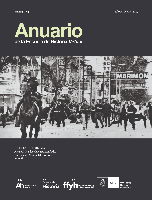
Anuario de la Escuela de Historia Virtual
Fostering Innovative Research in Historical ContextsAnuario de la Escuela de Historia Virtual is a distinguished academic journal published by the Universidad Nacional de Córdoba, Facultad de Filosofía y Humanidades. With its focus on the field of history, this peer-reviewed journal aims to foster scholarly discussion and disseminate innovative research that contributes to the understanding of historical contexts and narratives. Since transitioning to an Open Access model in 2010, it has greatly increased accessibility for researchers, professionals, and students, thereby promoting a greater exchange of knowledge across linguistic and geographical boundaries. Published under the ISSN 1853-7049, the journal provides invaluable insights into historical analysis, methodologies, and interdisciplinary approaches, ensuring its relevance in contemporary academic discourse. Its commitment to high-quality, impactful research positions it as a vital resource within the historical scholarship landscape.
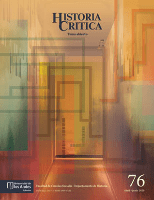
Historia Critica
Navigating the Complexities of History and CultureHistoria Critica is a distinguished academic journal published by UNIV ANDES in Colombia, focusing on the interdisciplinary fields of Cultural Studies, History, and Geography. With an impressive impact factor driven by its robust ranking—Q1 in Cultural Studies and History, as well as notable placements in Geography, Planning and Development, and Social Sciences—this journal is an essential resource for researchers, professionals, and students alike. Since its inception in 1989, Historia Critica has committed to providing Open Access content, allowing for a wider dissemination of scholarly work and fostering collaboration among academics globally. The journal aims to encourage critical discourse and innovative research by publishing significant studies that explore the complexities of cultural and historical narratives. Operating from its headquarters in Bogota, Colombia, the journal continues to play a vital role in advancing scholarship in its respective fields, making it an invaluable asset for those seeking to deepen their understanding of cultural dynamics and historical perspectives.

Antiteses
Empowering Research with Unrestricted AccessAntiteses is a distinguished academic journal published by UNIV ESTADUAL LONDRINA, serving as an indispensable platform for scholarly discourse in the humanities and social sciences. With an ISSN of 1984-3356 and an E-ISSN matching the same number, this peer-reviewed journal has embraced the Open Access model since 2008, ensuring that cutting-edge research is readily available to researchers, professionals, and students globally, thereby fostering an inclusive academic community. Antiteses aims to explore critical discourses across various domains, encouraging innovative thoughts and discussions that challenge conventional paradigms. Located in Londrina, Paraná, Brazil, the journal maintains its commitment to high academic standards, although specific metrics such as H-Index or impact factor remain to be established. Its open-access nature aligns with contemporary trends towards equitable access to knowledge, making it a vital resource for those invested in the evolution of academic thought.

Cadernos de Historia
Exploring the Depths of Historical NarrativesCadernos de Historia, published by the Pontifícia Universidade Católica de Minas Gerais, is a pivotal open-access journal that has been enriching the field of historical studies since its inception in 2010. With an ISSN of 2237-8871, this journal provides a platform for innovative research and critical discourse in history, appealing to an audience of academics, researchers, and students alike. Located in Belo Horizonte, Brazil, the journal fosters international collaboration and dissemination of knowledge, ensuring that the latest findings in historical research are accessible to a global community. While the journal’s HIndex is currently not specified, its commitment to scholarly excellence is evident through its rigorous peer-review process. Cadernos de Historia stands out as a vital resource for those engaged in the study of historical narratives, methodologies, and interdisciplinary approaches, making it an essential addition to any historian's collection.
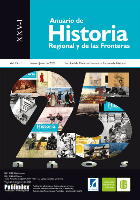
Anuario de Historia Regional y de las Fronteras
Connecting Scholars through the Lens of Regional HistoryAnuario de Historia Regional y de las Fronteras is a distinguished academic journal published by UNIV INDUSTRIAL SANTANDER, focusing on the multifaceted intersections of regional history and border studies. With an ISSN of 0122-2066 and E-ISSN of 2145-8499, this Open Access journal has been at the forefront of scholarly discourse since 1995, providing researchers, professionals, and students with a platform for disseminating rigorous historical research and analysis. The journal aims to enhance understanding of regional dynamics and the socio-political implications of borders, fostering interdisciplinary dialogue and critical insights into historical narratives. Based in Bucaramanga, Colombia, the journal plays a vital role in promoting Latin American perspectives and enriching global historiography. As it endeavors to impact the field significantly, Anuario de Historia Regional y de las Fronteras invites contributions from scholars worldwide who share a passion for exploring the complexities of regional histories and borders.
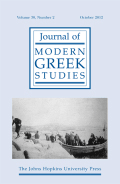
JOURNAL OF MODERN GREEK STUDIES
Engaging with the Pulse of Contemporary Greek StudiesJOURNAL OF MODERN GREEK STUDIES, published by Johns Hopkins University Press, is an esteemed academic journal dedicated to the exploration and analysis of contemporary Greek culture, history, and society. With its ISSN 0738-1727 and E-ISSN 1086-3265, this journal significantly contributes to the fields of Cultural Studies, History, Sociology, and Political Science, consistently ranking within the upper quartiles in 2023. As a vital resource for researchers, professionals, and students, the journal provides a platform for interdisciplinary scholarship and critical discourse, enhancing our understanding of modern Greece from various perspectives. Readers can access a range of scholarly articles and reviews that delve into the complexities of Greek identity and its historical narratives. With converged years from 2002 to 2024, the JOURNAL OF MODERN GREEK STUDIES remains a pivotal reference point for those interested in Greek studies, underlining its importance and relevance within both national and international academic circles.

Topoi-Revista de Historia
Diving Deep into the Layers of HistoryTopoi-Revista de Historia is a distinguished journal dedicated to advancing the field of historical studies. Published by the Programa Pos-Graduacao Historia - Universidade do Estado do Rio de Janeiro, this Open Access journal has been serving the academic community since 2000, fostering the dissemination of knowledge on diverse historical topics. With its ISSN 2237-101X, Topoi stands out in the field, holding a Q2 ranking in History (2023) and positioned in the 34th percentile of its discipline according to Scopus. The journal is committed to promoting high-quality research through a rigorous peer-review process, making it an invaluable resource for researchers, professionals, and students alike. The editorial team is dedicated to publishing innovative studies from both Brazilian and international scholars, ensuring a rich and comprehensive dialogue within the global historical landscape. Reach out to explore its latest contributions to the understanding of history, available to scholars around the world.